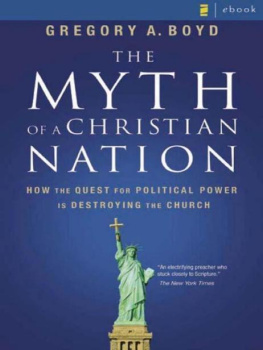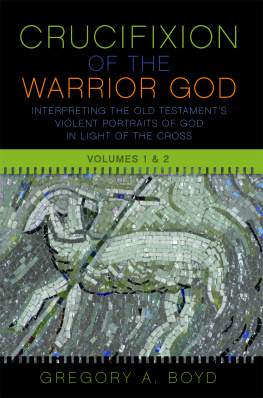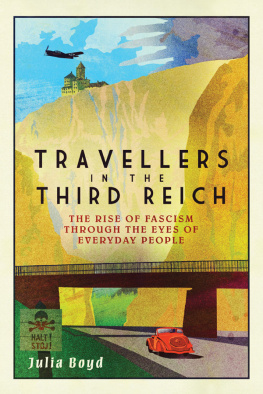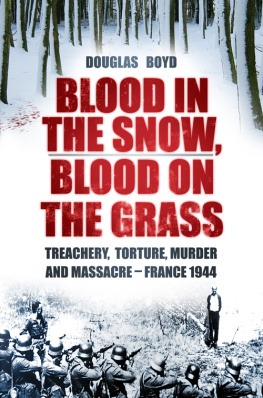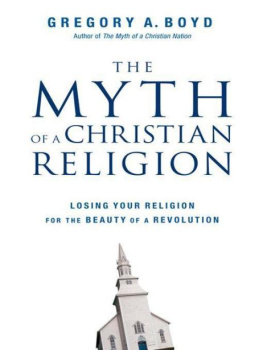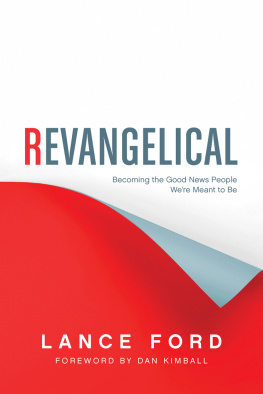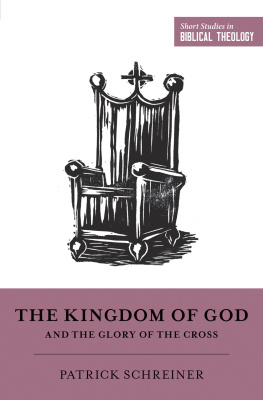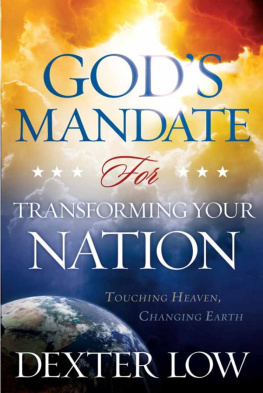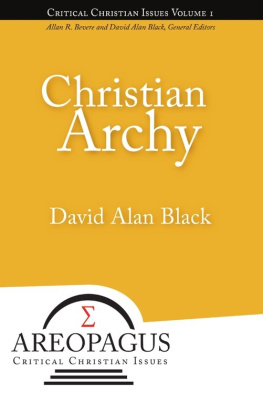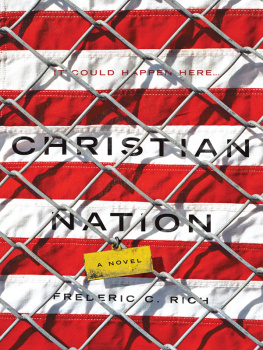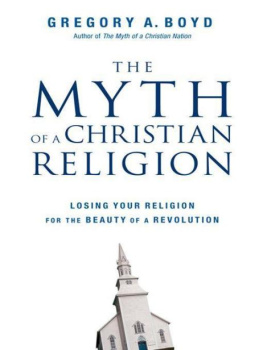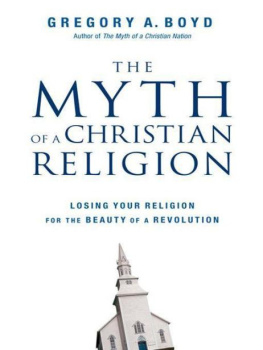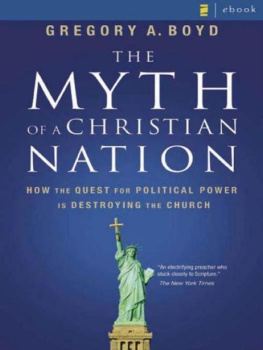GREGORY A. BOYD
THE MYTH OF A CHRISTIAN NATION
HOW THE QUEST FOR POLITICAL POWER
IS DESTROYING THE CHURCH


The Myth of a Christian Nation
Mobipocket Reader format
Copyright 2005 by Gregory A. Boyd
Requests for information should be addressed to:
Zondervan, Grand Rapids, Michigan 49530
ISBN: 0-3102-8124-5
All Scripture quotations, unless otherwise indicated, are taken from the New Revised Standard Version of the Bible , copyrighted 1989 by the Division of Christian Education of the National Council of Churches of Christ in the United States of America, and are used by permission. All rights reserved.
The website addresses recommended throughout this book are offered as a resource to you. These websites are not intended in any way to be or imply an endorsement on the part of Zondervan, nor do we vouch for their content for the life of this book.
All rights reserved. No part of this publication may be reproduced, stored in a retrieval system, or transmitted in any form or by any meanselectronic, mechanical, photocopy, recording, or any otherexcept for brief quotations in printed reviews, without the prior permission of the publisher.
Cover design: brandnavigation.com
Cover photo: Veer
To my wonderful stepmother,
Jeanne Boyd.
Your love, patience, and understanding
made the last two decades
of my fathers life his best.
What a gift you are!
All of us kids love and appreciate you
more than words can say.
CONTENTS
1
THE KINGDOM OF THE SWORD
2
THE KINGDOM OF THE CROSS
3
KEEPING THE KINGDOM HOLY
4
FROM RESIDENT ALIENS TO CONQUERING WARLORDS
5
TAKING AMERICA BACK FOR GOD
6
THE MYTH OF A CHRISTIAN NATION
7
WHEN CHIEF SINNERS BECOME MORAL GUARDIANS
8
ONE NATION UNDER GOD?
9
CHRISTIANS AND VIOLENCE:
CONFRONTING THE TOUGH QUESTIONS
HOW THIS BOOK CAME TO BE AND WHY IT MAY IRRITATE SOME READERS
L IKE MANY EVANGELICAL PASTORS IN THE MONTHS BEFORE THE 2004 election, I felt pressure from a number of right-wing political and religious sources, as well as from some people in my own congregation, to shepherd my flock into voting for the right candidate and the right position. Among other things, I was asked to hand out leaflets, to draw attention to various political events, and to have our church members sign petitions, make pledges, and so on. Increasingly, some in our church grew irate because of my refusal (supported by the church board) to have the church participate in these activities.
In April of 2004, as the religious buzz was escalating, I felt it necessary to preach a series of sermons that would provide a biblical explanation for why our church should not join the rising chorus of right-wing political activity. I also decided this would be a good opportunity to expose the danger of associating the Christian faith too closely with any political point of view, whether conservative or liberal. I had touched on this topic several times in the past but never as deeply, clearly, and persistently. The series was entitled The Cross and the Sword, and it forms the foundation for this book.
The response surprised me. For one thing, I had never received so much positive feedback. Some people literally wept with gratitude, saying that they had always felt like outsiders in the evangelical community for not toeing the conservative party line. Others reported that their eyes had been opened to how they had unwittingly allowed political and national agendas to cloud their vision of the uniquely beautiful kingdom of God.
But neither had I ever received so much intensely negative feedback. I felt as though Id stuck a stick in a hornets nest! About 20 percent of my congregation (roughly a thousand people) left the church.1
Many who left sincerely believe there is little ambiguity in how true Christian faith translates into politics. Since God is against abortion, Christians should vote for the pro-life candidate, they believeand the preacher should say so. Since God is against homosexuality, Christians should vote for the candidate who supports the marriage amendment actand a Bible-believing pastor should proclaim this. Since God is for personal freedom, Christians should vote for the candidate who will fulfill Americas mission to bring freedom to the worldand any American pastor, like myself, should use his God-given authority and responsibility to make this known. Its that simple, I was told. To insist that its not , some suggested, is to be (as I was variously described) a liberal, a compromiser, wishy-washy, unpatriotic, afraid to take a stand, or simply on the side of Satan.
Some readers undoubtedly share these convictions and may already be responding negatively to this book. Like many American evangelicals, you may assume that espousing a certain political position is simply part of what it means to be Christian. It may be difficult for you to fathom how an evangelical pastor could, for theological reasons, refuse to use the pulpit to support a pro-life, pro-family, pro-Christian values, pro-American political platform. Arent we supposed to be trying to take America back for God? Consequently, you too may be tempted to write me off as liberal, a compromiser, wishy-washy, unpatriotic, afraid to take a stand, or on the side of Satan. If so, let me assure you that, for all my shortcomings, I dont believe any of those labels accurately describes me.
And Id ask you to hear me out.
At the outset, I want you to know I appreciate and respect your convictions. I understand the consternation you may feel, but at the same time, I challenge you to keep an open mind and to consider this books arguments. I know how difficult it is to take a book seriously when it confronts ones most cherished beliefs. I also know that few things in life are as intellectually and spiritually beneficial as forcing ourselves to consider ideas different from our owneven ideas that may irritate and offend.
This book may well irritate and offend you at times. You may never agree with me. But I believe that wrestling with these issues will benefit you nonetheless. I only ask that you hear me out.
THE CENTRAL THESIS OF THIS BOOK
My thesis, which caused such an uproar, is this: I believe a significant segment of American evangelicalism is guilty of nationalistic and political idolatry. To a frightful degree, I think, evangelicals fuse the kingdom of God with a preferred version of the kingdom of the world (whether its our national interests, a particular form of government, a particular political program, or so on). Rather than focusing our understanding of Gods kingdom on the person of Jesuswho, incidentally, never allowed himself to get pulled into the political disputes of his dayI believe many of us American evangelicals have allowed our understanding of the kingdom of God to be polluted with political ideals, agendas, and issues.
For some evangelicals, the kingdom of God is largely about, if not centered on, taking America back for God, voting for the Christian candidate, outlawing abortion, outlawing gay marriage, winning the culture war, defending political freedom at home and abroad, keeping the phrase under God in the Pledge of Allegiance, fighting for prayer in the public schools and at public events, and fighting to display the Ten Commandments in government buildings.
I will argue that this perspective is misguided, that fusing together the kingdom of God with this or any other version of the kingdom of the world is idolatrous and that this fusion is having serious negative consequences for Christs church and for the advancement of Gods kingdom.

